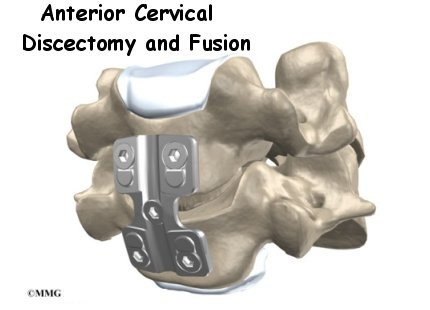The Colts kept quiet about Manning's recovery problems with the last surgery, trying to buy time to see if Peyton could rehab it enough to play. However, lingering weakness in his triceps from a slowly regenerating nerve root, and a sudden increase in pain when he attempted harder workouts, led to the decision of the neck fusion.
See: Peyton Manning Has Third Neck Surgery for a description of what the surgery entailed.
What Will His Recovery Look Like?
Peyton will be in a cervical neck collar to restrict his movement while the bone graft placed in his disc space fuses to the neighboring vertebrae. This, along with a small bone plate, will provide some stability for that particular neck joint, which should protect the spinal cord in the initial weeks/months following surgery.
 |
| Image courtesy of concordortho.com |
Then he will begin to strengthen his neck and back from the severe weakness that it will no doubt undergo simply following surgery and all those weeks of limited activity.
Will He Play Again??
No one can tell you that now, and no one will be able to tell for at least several weeks. The key factor is whether the nerve that has been damaged all this time will be able to recover. If it doesn't, he won't have the strength in his triceps to throw the ball at a level needed in the NFL. If he does recover, it could take months. That nerve has been damaged for quite a while. Nerves heal very, very slowly, and sometimes not at all.
Other players have had this surgery and gone on to play in the NFL again (Steve Slaton of the Houston Texans is one of 40 players to play after a neck fusion). However, these players did not have nerve damage in the way that Peyton has had.
One well-known wide receiver, the Green Bay Packers' Sterling Sharpe had to have a similar procedure done in 1994 following an injury in a game, and it ended his career.
Should He Play Again??
There is no doubt that, even if everything heals perfectly, Peyton's body won't be the same as it was before. It will limit his neck rotation and flexion, crucial for a NFL quarterback who needs to keep his head on a swivel watching his receivers and blitzing linebackers.
One item to note: there has never been a starting NFL quarterback to undergo this procedure and return to the playing field.
I actually feel worse for him that he can't hold his little baby twins that his wife gave birth to in March. For a brand new father, I'm quite sure that hurts more than not playing a football game.
What happens when he gets hit?
"He's going to be at risk for an injury from a whiplash-type event, and that injury could potentially mean one to the spinal cord," said Dr. Ty Thaiyananthan, neurosurgeon and co-medical director of the Chapman Neurosurgical and Spine Institute in Orange. "I think most doctors would keep a very close eye on a patient that would want to go back and play football after an operation like that."
I still believe the ultimate issue is whether or not he regains his strength in his arm. The surgery is a success if it alleviates his pain, but his career rides on that nerve regenerating.
However, with some much uncertainty regarding Peyton's recovery, it's inconceivable that the Colts wouldn't look to draft a new quarterback in next year's draft. If they make the right choice with one of the top picks (Andrew Luck, Matt Barkley, Landry Jones), the future is still bright in Indianapolis.

No comments:
Post a Comment